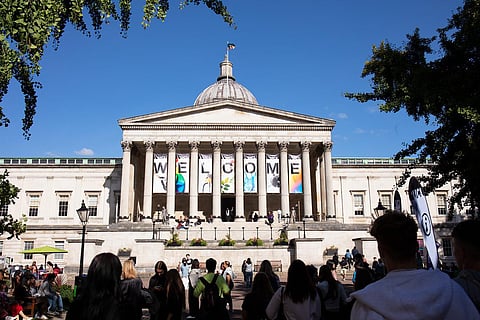University College London, Artificial Intelligence and India
What steps is UCL taking to address the ethical implications of AI in education? Are there specific programmes or initiatives that help students understand the responsible use of AI in various fields?
Artificial Intelligence (AI) holds transformative potential in education, serving as a catalyst for creativity, background research and — particularly for students whose first language may not be English — enhancing grammar, structural proficiency and facilitating the use of different writing styles. We know that AI literacy is becoming an essential professional and life skill so it is vital that universities proactively integrate this into their approach.
Embracing AI is crucial for today’s students as they prepare to enter a world of work that is very different to even five years ago, and is rapidly adopting innovative working methods.
On November 17, I enjoyed a lively panel discussion with Ashok Panda, Vice-President & Global Head AI & Automation Services at Infosys as part of an education fair in Bengaluru, focusing on the future of AI in universities and the workplace. We enjoyed a rich dialogue on AI's impact on education, how universities are leveraging it for research, and the skills industries seek in today’s graduates.
At UCL, we are fostering an environment where students are encouraged to engage with AI tools in a playful and creative way, exploring AI’s capabilities but also its limitations to enhance their learning experience.
We are committed to providing our students and staff with up-to-date information on the many ways AI can support learning and its application in various forms of assessment. Through AI-driven learning tools and data analytics, we are personalising education.
This approach allows students to engage deeply with material at their own pace, focusing on developing critical, adaptable skills that will stand them in good stead for their future careers.
UCL’s research in AI is world leading, and our Centre for Artificial Intelligence offers a comprehensive range of programmes, including PhD and Master’s degrees in Machine Learning and other pivotal areas of AI. The Centre equips students with the expertise to develop novel AI algorithms, fostering a profound understanding of the field.
As society advances towards greater automation, our programmes empower students to lead in AI innovation, crafting bespoke solutions to complex, real-world challenges.
How does UCL approach the challenge of preparing youth for the future of work in an era of rapid technological change? What role does UCL’s research play in ensuring that digital skills and social structures are equipped for this transition?
The future of work will be defined by our ability to leverage flexible working arrangements and embrace emerging technologies. At UCL, our Innovation & Enterprise team is dedicated to equipping students with entrepreneurial skills that are transferable across various domains, enabling them to launch their own ventures.
All current students and recent graduates can join in free extracurricular activities at BaseKX, UCL’s entrepreneurship hub located in King’s Cross. Here, they can develop their startups into successful businesses or social enterprises through our equity-free Hatchery startup incubator programme.
Additionally, for graduates wishing to remain in the UK to start a business, we offer support in obtaining endorsement for an Innovator Founder visa.
This thriving entrepreneurial community develops startups that go on to attract millions of pounds of investment, creating jobs and spearheading innovation. In fact, more than 500 new student startups have been started at UCL between 2014 and 2023. Collectively they have raised over £360 million in investment and currently employ over 2,000 people.
Whether students aim to launch their own ventures, address global challenges, or enhance their employability, we provide the necessary skills and guidance to take those crucial first steps.
For instance, Dr Nikhit Anilbhai and Sonakshi Senthil, who completed their postgraduate studies at UCL in 2019, transformed their passion for healthcare into a thriving business. Their company, Your Cue, is at the forefront of healthcare innovation, offering wearable solutions that enable continuous monitoring of patient vital signs both at home and in clinical settings.
How can collaborations between UK and Indian institutions in AI research contribute to more adaptable and future-ready education systems in both countries?
To tackle today's global challenges, it's crucial for universities, governments, schools, and businesses to work together. UCL's longstanding collaborations with Indian partners such as IISc Bengaluru, All India Institute of Medical Sciences (AIIMS) and the Indian Institute of Technology (IIT) Delhi are helping create AI solutions that are not only scalable and ethical but also relevant to different contexts.
By sharing these ideas and expertise globally, and learning from each other in the process, we can speed up the use of AI in education and make sure its benefits reach everyone.
UCL’s vision AI for People and Planet seeks to position AI as a force for good. It encapsulates our belief that the purpose of research and innovation in AI and related technologies is ultimately to benefit people and societies around the world, and to make a positive impact on the planet.
This vision is a framework for AI research and training at UCL, and by extension our partners as well, which include Google DeepMind, AstraZeneca, the World Health Organization, AI Council, Cognition X, the OECD and CENTURY, as well as our Indian partners.
Through our work together we can consider how we to harness advances in AI to enhance or improve humans and their societies; how we can include marginalised, disfavoured or disadvantaged communities in our AI work; interdisciplinarity and strengthening links between experts working across different areas; making code and data openly available wherever possible; and identifying the potential for misuse.



